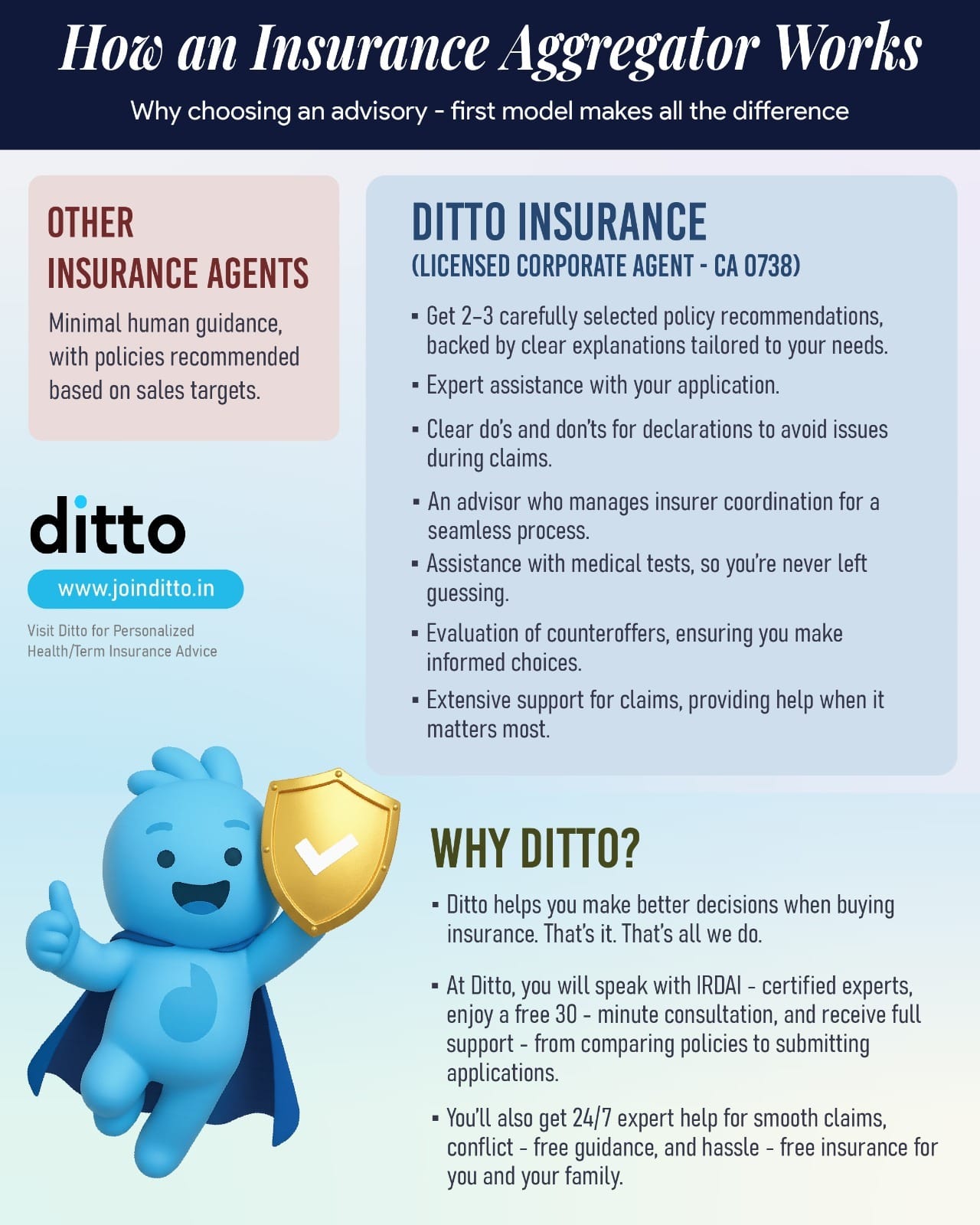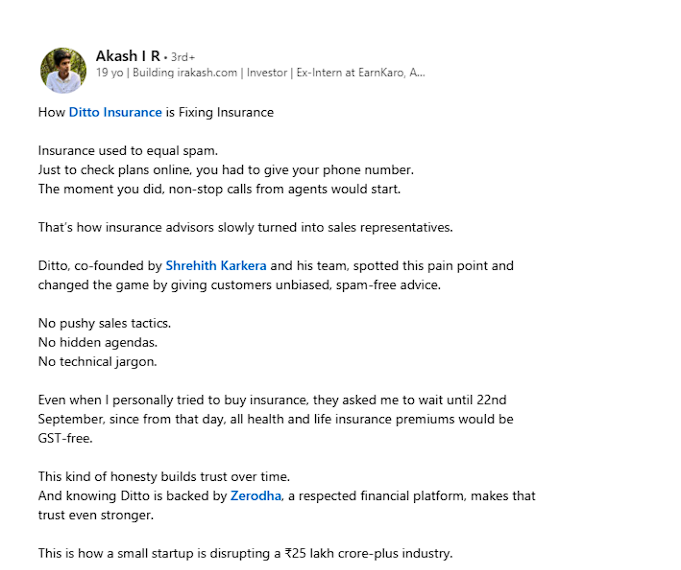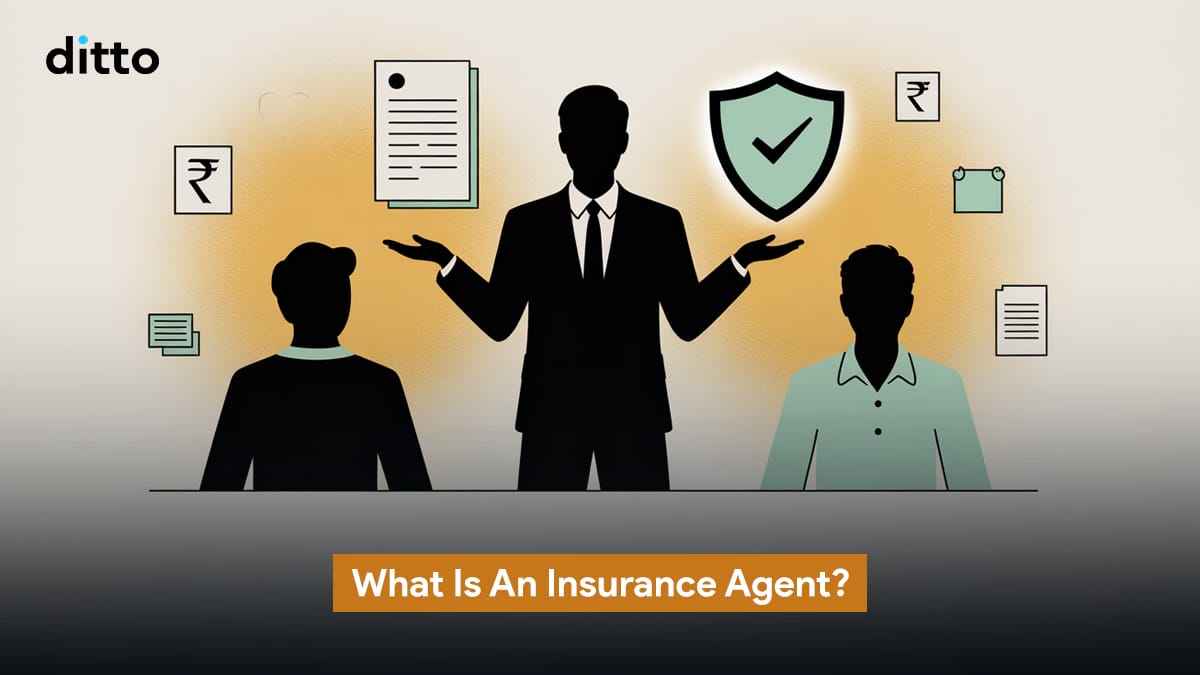| What is an Insurance Agent? An insurance agent is a licensed individual or entity authorised to sell, solicit, or negotiate insurance on behalf of one or more insurance companies. Agents act as a bridge between insurers and customers to help people and businesses understand their protection needs, choose suitable policies, and manage ongoing services, such as renewals, endorsements, and claims. |
Insurance agents form the backbone of India’s insurance industry because they guide millions of people through complex policy options, claims, and renewals. A good agent always helps families make confident, long-term financial decisions.
At Ditto, our advisors interact with thousands of customers every month who often seek policy guidance and servicing. Through these conversations, we’ve seen how much trust people place in intermediaries when making financial decisions. That’s why it’s important to understand how insurance agents or intermediaries are regulated, trained, and monitored under IRDAI’s framework.
This guide is based on IRDAI’s latest circulars, along with practical insights from Ditto’s advisory team.
By the end of the article, you’ll know:
- What is an insurance agent, and what do they do?
- Why do their roles matter, and how do they differ from intermediaries?
- How Ditto Insurance is transforming the way people understand and buy insurance in India.

Key Responsibilities of an Insurance Agent
- Lead Generation and Prospecting: Continuously engage in gathering potential client contacts to bring more business opportunities and improve income prospects.
- Consulting Clients and Assessing Needs: Communicate with clients and understand their insurance and financial needs to suggest suitable plans, ensuring customer satisfaction and trust.
- Policy Sales: Provide detailed information about insurance products, explain terms and conditions, assist in selecting appropriate policies, and guide clients through the application process until policy issuance.
- Follow-ups and Customer Relationship Management: Maintain ongoing relationships with clients through regular follow-ups, ensure timely renewals, and provide continued support throughout the policy lifecycle.
- Post-Sale Services and Claim Assistance: Help clients with policy renewals, update them on policy changes, address queries, and support them during the claims process to ensure smooth settlement.
- Compliance and Updating Knowledge: Stay informed about insurance products, market trends, and regulatory requirements to provide accurate advice and comply with legal standards.
Ready to choose the correct health or plan without the hassle? Get expert guidance from Ditto’s IRDAI-certified advisors to select a policy that perfectly matches your needs, income, and your family’s future—no spam, no sales pitches—just clear, reliable advice. Book a free call today!
What Does an Insurance Agent Do?
Becoming an insurance agent in India isn’t just about selling policies. It’s more about earning the regulator’s trust to represent an insurer in front of the public.
Here is a list of the key requirements and duties of an insurance agent:
- Fulfill the IRDAI (Appointment of Insurance Agents) Regulations, 2016
An individual must complete mandatory pre-licensing training, clear the IRDAI-approved examination, and be formally appointed by a corporate agent or other licensed distributors. Only after that can they solicit insurance business.
- Follow Code of Conduct
Once appointed, an agent is bound by a strict Code of Conduct, a legal and ethical rulebook that demands honesty, transparency, and customer-first behavior.
- Be Transparent with Customers
Agents must clearly explain policy benefits, standard or permanent exclusions, and obligations. This also involves identifying real customer needs and ensuring every proposal form is completed truthfully. However, they cannot offer rebates, make false promises, misrepresent returns, or conceal terms. Every sale is supposed to be based on suitability, not persuasion.
- Provide Uninterrupted Service to Policyholders
Agents also carry a continuing duty beyond the sale to help customers with renewals, claims, and policy servicing. If an agent leaves or their licence is cancelled, the insurer must still provide uninterrupted servicing to those policyholders through reassignment or online access.
Most importantly, insurers themselves are responsible for monitoring and disciplining their agents to ensure compliance with IRDAI’s guidelines.
Bottom Line: A licensed insurance agent bridges the gap between a complex insurance contract and an ordinary consumer’s understanding, with a duty to protect the customer’s interest while representing the insurer.
Types of Insurance Agents and Intermediaries in India
Here’s a clear comparison between an insurance agents and intermediaries to help you understand their roles, responsibilities, and differences:
| Type | Who They Represent | How They Work | Commission / Payment | No. of Insurers Allowed |
| Individual Agent | One or more insurers (max: 1 Life, 1 General, 1 Health, 1 mono-line) | Sells and services policies for appointed insurers; assists in claims and renewals. | As per insurer’s Board-approved policy within IRDAI’s EoM limits (since 2023). | 1 per line of business. (Proposal provided to expand this) |
| Corporate Agent | Insurer(s) they are tied with (banks, NBFCs, large firms) | Employs staff to sell insurance through their branches; responsible for conduct of all staff. | Same as above — within insurer’s Board-approved limits. | Up to 9 Life + 9 General + 9 Health (max 27). |
| Insurance Broker | Represents the customer, not any insurer | Can place business with multiple insurers; gives unbiased advice and claims support. | Commission per insurer’s Board policy + may charge client fees (as per IRDAI rules). | Unlimited (no cap). |
| Insurance Marketing Firm (IMF) | Multiple insurers | Local firm selling through trained Insurance Sales Persons (ISPs). | Paid as per insurer’s Board-approved policy within EoM limits. | Up to 6 Life + 6 General + 6 Health. |
| Web Aggregator | Multiple insurers | Online comparison and lead platform for digital sales. | Paid per IRDAI (Web Aggregators) Regs + Board policy. | No fixed cap; multiple tie-ups allowed. |
| Common Service Centre (CSC) | Works under insurer / intermediary licence | Government-backed points of sale in rural areas. | Paid under the sponsoring insurer/intermediary’s policy. | No specific cap. |
Which Insurance Agents are Recognized by the IRDAI?
According to IRDAI, the term ‘agent’ broadly includes several categories of licensed distribution entities such as:
- Individual Agents: Represent one or more insurers and directly interact with customers to sell policies.
- Corporate Agents: Companies, banks, or institutions registered with IRDAI to distribute insurance products.
- Insurance Brokers: Independent professionals or firms who represent the customer’s interests and can place business with multiple insurers.
- Insurance Marketing Firms (IMFs): Local firms authorised to sell across multiple insurers through trained Insurance Sales Persons.
- Web Aggregators and Online Platforms: Digital entities licensed to display, compare, and sell policies online.
- Common Service Centres (CSCs): Government-backed points of sale extending insurance to rural and remote areas.
How Can I Verify If My Agent is Licensed or Authorized?
It’s important to verify that your insurance agent or intermediary is licensed by the IRDAI. This ensures that you’re dealing with a qualified professional who is legally authorized to sell insurance products. Here’s how you can check:
- For Individual Agents: Go to IRDAI’s Agency Portal and navigate to PAN Lookup. Enter the agent’s PAN number or name to check their licence status and insurer association.
- For Corporate Agents (Banks, NBFCs, Companies): Check IRDAI’s List of Valid Corporate Agents (PDF).
- For Brokers, Web Aggregators, and IMFs: You can check registered entities by visiting irdai.gov.in → Intermediaries / Distribution, then selecting the relevant type—Broker, Web Aggregator, or IMF.
- Cross-check With Your Insurer: Your policy document or proposal form shows the agent code and name. You can confirm this with the insurer’s customer care to verify it matches an authorised representative.
Tip: Always deal only with agents who can show a valid IRDAI licence or registration number. Anyone unwilling to share it or offering cashbacks/rebates is likely unauthorised.
Importance of Insurance Agents
The following points highlight why insurance agents matter.
- Insurance Isn’t a Simple Financial Product
Insurance is a risk-transfer contract filled with conditional clauses, medical disclosures, and claim procedures. Every proposal must match the buyer’s health, income, dependents, and liabilities.
A small mistake (for e.g, non-disclosure of a health condition or incorrect nominee) can void a claim years later. That’s why human guidance at the point of sale still matters far more than in mutual funds, where performance and risk are transparent and can be compared online.
- The industry’s Historical “Push” Structure
Insurance is a “push product,” and people rarely wake up wanting to buy it. In India, even with IRDAI’s push for digital adoption, over 85% of retail insurance business (life and health combined) still flows through agents, bancassurance, or corporate channels.
Agents bridge that intent gap by educating people, building trust, and simplify paperwork, particularly for customers with limited financial literacy or digital comfort.
- Claims and Servicing: Where Agents Add Real Value
When a claim arises, an agent or broker acts as the policyholder’s first support system. They help collate documents, coordinate with the insurer, and interpret policy clauses.
Direct digital buyers often discover at claim time that they misunderstood waiting periods, sub-limits, or exclusions.
Did You Know?
-
Under IRDAI’s 2024 Master Circular, insurers must offer two options:
- Access to online self-service tools, or
- Reassignment to another agent or sales staff.
- Policyholders can request a change of agent, but approval rests solely with the insurer.
- To request reassignment, write to the insurer with your policy number, agent code, and reason (e.g., relocation or unresponsiveness).
- Policies cannot be directly transferred to another agent by the customer.
- New agents cannot claim commissions on past sales. They can only assist with future servicing.
- Agents and intermediaries must disclose commissions or rewards received from insurers if asked, as per the IRDAI (Payment of Commission) Regulations, 2023.
- All distribution channels must act transparently, ensuring customers are aware of all cost components.

Why Buying Directly from the Insurer Isn’t Always the Smartest Move
Limited Product Comparison
Direct purchase locks you into one insurer’s portfolio, unlike an agent, broker, or IMF who can compare across insurers.
No Advisory Accountability
When you buy direct, you bear the responsibility for mis-selection. Agents and intermediaries, on the other hand, are bound by the IRDAI Code of Conduct to recommend suitable products.
Servicing Gaps
If you buy online and face an issue later, escalation paths are limited to customer care. With an agent or broker, you have a designated representative obliged to assist.
No Cost Advantage
Since 2023, commissions are embedded in insurers’ overall Expenses of Management (EoM) caps. Hence, insurers can allocate those funds to digital marketing or agents as they wish. Direct channels aren’t automatically cheaper because they just shift the cost from agent commission to digital acquisition spend.
How Ditto Helps
Ditto is a licensed corporate agent that provides advisory support and guidance while comparing multiple insurers. We currently focus on health and term life insurance and help you make informed choices while ensuring you get dedicated support throughout the policy lifecycle.
As a corporate agent, our scope isn’t limited to insurance. For instance,
- Our education initiative, FinShots, allows us to provide financial literacy and guidance beyond insurance products.
- Recent regulatory changes allow corporate agents like us to work with up to 9 health, 9 life, and 9 general insurance providers, which comfortably covers the top companies that meet our benchmarks. We offer robust choice and expertise without needing a broker’s license.
- While brokers may have the option to charge for advisory services, Ditto keeps its guidance free of cost. This makes it easier for clients to access informed recommendations without any pressure.
| Gradual Evolution Toward Hybrid Models IRDAI’s latest regulations encourage insurers to offer online servicing and re-assignment of agents if one leaves the company, ensuring continuous support. India’s current market is heading toward “phygital” distribution, where digital convenience coexists with human advice. Insurance will eventually become easier to buy online, but it is not fully self-service yet. The stakes of a bad purchase are too high, and the value of a competent agent or broker lies in preventing future claim heartbreaks, not in chasing quick discounts. |
Why Choose Ditto for Your Insurance?
At Ditto, we’ve assisted over 7,00,000 customers with choosing the right insurance policy. Why customers like Akash love us:

✅Rated 4.9/5 on Google Reviews by 5,000+ happy customers
✅Backed by Zerodha
✅100% Free Consultation
Final Thoughts
It's possible to find insurance on your own, but it requires more time and energy to research and compare policies. It's essential to shop for quotes from multiple insurers to help ensure you aren't paying too much for a policy.
Whether you're shopping for health, life, or another type of insurance, it's important to compare similar coverage plans and limits. This is where an insurance agent can help. However, they cannot help you with all aspects of insurance.
Most people get intimidated by all choices and complexity when considering health or term plans. Then, there's the issue of rampant mis-selling. This is where Ditto comes in to help you understand the policy, compare its offerings, and comply with the terms and conditions for a smooth claim settlement process.
If you are still confused about the kind of insurance you want, book a call or WhatsApp us to speak to our advisors at Ditto.
FAQs:
What is the skill of an insurance agent?
The key skills of an insurance agent include strong communication, sales, and interpersonal abilities. They must clearly explain complex insurance products, understand customer needs, and build trusted relationships.
What are the rights of an agent?
The rights of an insurance agent include the right to receive commission for policies sold, access to relevant information and training from the insurer, and fair treatment by the company. Agents also have the right to represent the insurer within their authority and to receive notice in case of contract termination.
What is the purpose of an insurance agent?
An insurance agent is a provider's representative who is responsible for selling policies and helping policyholders navigate the claims process. Some agents offer a variety of coverages, while others specialize in one category, such as homeowners insurance, auto insurance or life insurance.
What are common reasons to complain against an insurance agent or intermediary?
You can raise a complaint for mis-selling, false promises, or misrepresentation of benefits and returns. The same applies to those offering illegal rebates or inducements (banned under Section 41 of the Insurance Act 1938), unauthorized cash collection, forgery, or data misuse; or for failing to deliver service, such as not providing proposal copies, policy documents, or claim assistance.
What penalties can IRDAI impose for misconduct?
Depending on the severity, IRDAI may issue warnings, levy monetary penalties, or suspend / cancel the agent’s or intermediary’s registration under the relevant IRDAI regulations (for example, Appointment of Insurance Agents Regulations 2016 or Corporate Agents Regulations 2015).
How do I file a complaint against an agent or intermediary?
Contact your insurer’s Grievance Redressal Officer (GRO) first and share details of the issue with supporting documents. If not resolved within the insurer’s stipulated time (usually 15 days) or if unsatisfied, escalate via IRDAI’s Bima Bharosa portal to lodge a formal complaint against the insurer or intermediary. For unresolved issues that fall within its jurisdiction, approach the Council for Insurance Ombudsmen (CIO) at cioins.co.in, a free and independent forum for consumers.
What information should I provide when filing a complaint?
Include your policy or proposal number, agent/intermediary name and code, dates of interaction, copies of communications or receipts, and any evidence such as screenshots or call recordings. This helps regulators trace the case through the insurer’s internal records (which must log the sourcing agent and commissions paid).
How are such complaints resolved?
Most cases are settled at the insurer level or via IRDAI mediation. If a policyholder is still dissatisfied, the Insurance Ombudsman can issue a binding award. Under CIO rules, nearly 87 % of complaints are disposed within 90 days, often online.
Last updated on:










